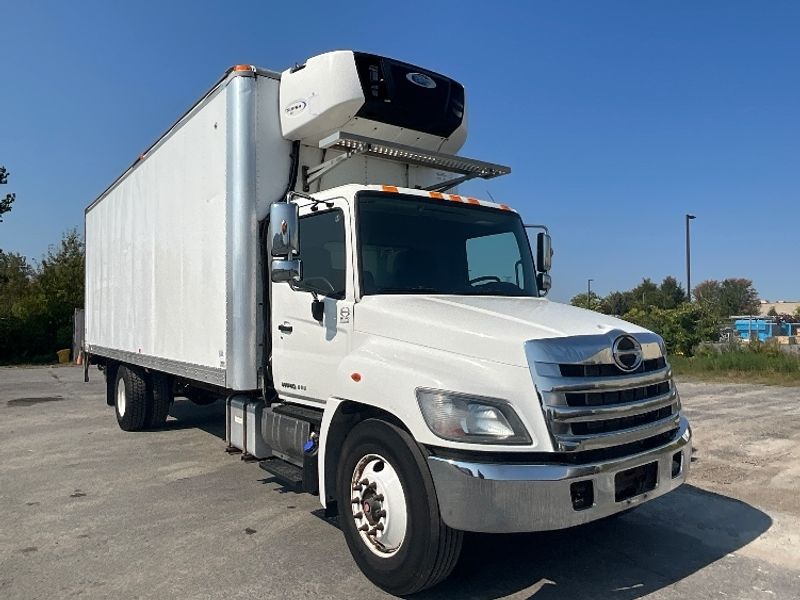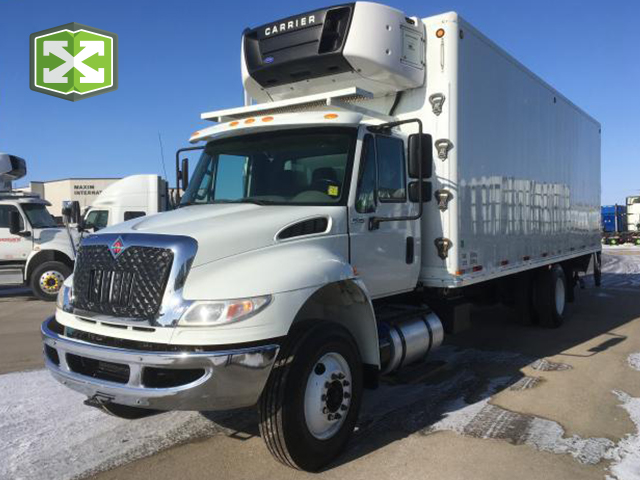Top Developments in Transport Refrigeration: Enhancing Effectiveness and Safety
The landscape of transportation refrigeration is going through considerable change, driven by developments targeted at boosting both performance and security. Key innovations such as wise temperature monitoring systems, eco-friendly cooling agents, and automated path optimization are critical in resolving the market's challenges. These modern technologies not only ensure the honesty of temperature-sensitive products yet likewise add to sustainability initiatives. As these developments remain to develop, it is essential to discover their implications on functional practices and governing compliance, motivating a closer assessment of how they improve the future of transportation refrigeration.
Smart Temperature Level Keeping Track Of Systems
In the realm of transport refrigeration, wise temperature level monitoring systems have actually arised as an important development for guaranteeing the stability of temperature-sensitive goods. These sophisticated systems take advantage of Net of Things (IoT) technology to give real-time data on temperature level variations, allowing drivers to maintain optimal conditions throughout the supply chain. By constantly tracking the temperature level of cooled containers and lorries, companies can swiftly determine variances that may endanger item top quality.

Moreover, clever monitoring systems often include automated informs and notices, permitting stakeholders to react promptly to any possible issues. This aggressive method not just decreases the threat of putridity but also enhances compliance with governing requirements governing food safety and pharmaceutical transport.
The assimilation of information analytics within these systems likewise helps with predictive upkeep, aiding operators to foresee prospective devices failures prior to they happen. This ability decreases downtime and enhances operational efficiency, inevitably resulting in set you back savings.
Eco-Friendly Refrigerants
Smart temperature level monitoring systems play a crucial duty in maintaining product top quality, however the performance of transportation refrigeration also hinges on the selection of refrigerants utilized. In comparison, arising alternatives like hydrocarbon-based refrigerants and hydrofluoroolefins (HFOs) existing lower GWP alternatives, offering both efficiency and sustainability.
These environment-friendly cooling agents not only reduce ecological influence yet additionally align with international laws intended at phasing out hazardous compounds. Their adoption can result in boosted power performance, ultimately reducing operating expense for transport refrigeration systems. The usage of natural refrigerants, such as ammonia and carbon dioxide, has gained grip due to their exceptional thermodynamic buildings and reduced ecological footprint.
Purchasing eco-friendly refrigerants is not simply a regulative compliance measure; it stands for a calculated choice that boosts brand credibility and fosters consumer commitment. thermo king transport refrigeration. By prioritizing lasting methods, companies can add to a greener future while making sure the stability of delivered products
Advanced Insulation Products
Using advanced insulation products is critical for optimizing transport refrigeration systems, as they substantially improve power effectiveness and keep regular temperature control. Typical insulation methods often drop short in stopping thermal transfer, leading to boosted energy usage and fluctuating temperatures within chilled compartments.
Arising products such as vacuum protected panels (VIPs) and aerogels use superior thermal resistance, enabling for thinner accounts without compromising efficiency. VIPs, as an example, utilize a vacuum cleaner layer to decrease conductive and convective warmth transfer, making them ideal for space-constrained applications. Aerogels, understood for their porous and light-weight framework, provide outstanding insulation while significantly decreasing total system weight.
Moreover, incorporating phase modification products (PCMs) right into insulation systems can further stabilize temperatures throughout transportation. These products soak up and release thermal energy, efficiently buffering against outside temperature level variants.
The assimilation of these innovative insulation products not just reduces the operational costs connected with energy usage however likewise prolongs the service life of temperature-sensitive items. As the transportation refrigeration sector remains to advance, the fostering of cutting-edge insulation modern technologies will certainly be crucial in boosting both performance and safety and security in chilled transportation.
Automated Course Optimization
The effectiveness of transportation refrigeration systems is considerably improved with automated path optimization, which leverages sophisticated algorithms and real-time data to establish one of the most effective courses for shipment. By evaluating different elements such as traffic patterns, climate condition, and delivery home windows, these systems can dramatically lower traveling time and fuel consumption.
Automated course optimization lessens human error and subjective decision-making, which can lead to inadequacies. This modern technology allows fleet managers to allot sources much more helpful resources effectively, making certain that cooled goods keep their needed temperature throughout the trip. By optimizing courses, business can also enhance client complete satisfaction through prompt deliveries.
In addition, automated systems can adapt to unforeseen scenarios, such as road closures or abrupt web traffic spikes, permitting vibrant rerouting. This adaptability not only protects the honesty of temperature-sensitive products yet also adds to total functional effectiveness.
Implementing automated path optimization can cause substantial price savings while minimizing the carbon impact related to transport. As businesses progressively focus on sustainability, this innovation sticks out as an essential part in modern-day transport refrigeration, lining up functional objectives with environmental obligation. Eventually, automated course optimization stands for a significant improvement in the pursuit for efficiency and safety in transport refrigeration.

Real-Time Information Analytics
Automated course optimization substantially take advantage of the integration of real-time information analytics, which supplies crucial insights right into the performance of transportation refrigeration systems. By using real-time data, transportation operators can monitor temperature level changes and equipment efficiency, making sure that perishable items are preserved within required criteria throughout transit. This aggressive method not just improves the quality of the moved products yet likewise minimizes the danger of putridity and loss.

In addition to enhancing performance, real-time analytics boosts security by guaranteeing conformity with governing requirements for temperature control. This not just secures public health see here and wellness but additionally strengthens a company's online reputation - thermo king transport refrigeration. As the transportation refrigeration market evolves, the assimilation of real-time Get More Information data analytics becomes a foundation for driving development, sustainability, and functional excellence
Verdict
Finally, the advancements in transportation refrigeration considerably boost both effectiveness and safety and security within the market. Smart temperature level tracking systems and real-time information analytics offer crucial oversight, while green refrigerants and progressed insulation products contribute to sustainability and power efficiency. Automated course optimization formulas not only lower travel time however additionally minimize environmental influence. Collectively, these advancements stand for a vital advancement in transport refrigeration, making sure conformity with regulatory standards and promoting a greener future.
The landscape of transportation refrigeration is undertaking substantial transformation, driven by innovations aimed at enhancing both efficiency and safety.Smart temperature tracking systems play an important duty in keeping item top quality, yet the performance of transportation refrigeration likewise pivots on the option of refrigerants used. Their adoption can lead to enhanced power performance, eventually minimizing operating expenses for transport refrigeration systems. Ultimately, automated route optimization stands for a substantial improvement in the mission for efficiency and safety in transportation refrigeration.
In verdict, the improvements in transport refrigeration considerably enhance both performance and security within the market.